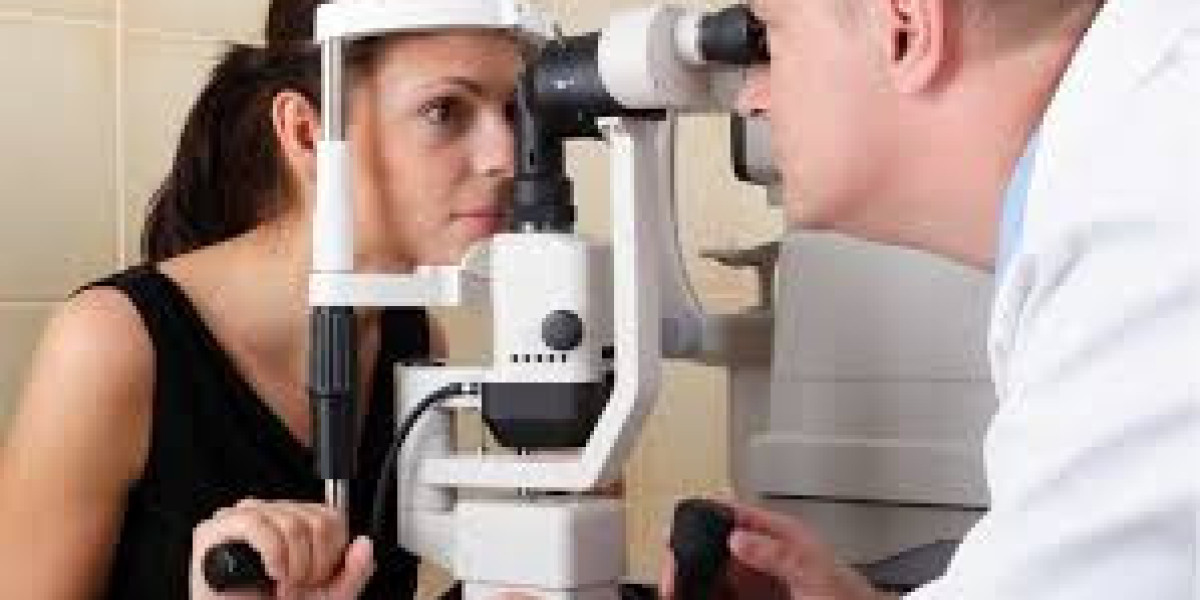Global Ophthalmic Devices Market Analysis
The global ophthalmic devices market is on a robust growth trajectory, projected to reach a value of US$ 10.22 billion by 2032, up from US$ 6.79 billion in 2023. This represents a CAGR of 4.64% from 2024 to 2032. The market's expansion is largely driven by technological innovations, an aging global population, and the increasing prevalence of eye disorders. As the demand for advanced eye care solutions rises, the ophthalmic devices market is poised for significant advancements in both diagnostics and treatment options.
Request a free sample copy of the report: https://www.renub.com/ophthalmic-devices-market-p.php
Ophthalmic Devices Market Definition
Ophthalmic devices are medical instruments designed for diagnosing, treating, and monitoring various eye diseases and conditions. These devices help ophthalmologists and optometrists assess visual acuity, detect refractive errors, monitor intraocular pressure, and evaluate ocular structures like the retina, optic nerve, and cornea. Key devices include:
- Slit lamps for examining the anterior segment of the eye
- Fundus cameras for capturing images of the retina
- Tonometry devices for measuring intraocular pressure
- Optical coherence tomography (OCT) systems for high-resolution imaging of retinal layers
- Autorefractors for determining refractive errors
- Intraocular lenses (IOLs), contact lenses, and eyeglasses for vision correction
- Surgical devices like excimer lasers used in procedures such as LASIK and PRK
These devices cater to a wide array of eye conditions, including refractive errors, cataracts, glaucoma, macular degeneration, and diabetic retinopathy.
Key Drivers of Growth in the Ophthalmic Devices Market
1. Aging Population and Growing Incidence of Eye Disorders
The global demographic landscape is shifting toward an older population, which is directly contributing to the increased demand for ophthalmic devices. According to the World Health Organization (WHO), by 2030, one-sixth of the world’s population will be 60 years or older, with the number of people aged 60 and above expected to reach approximately 1.4 billion by 2030 and 2.1 billion by 2050.
As people age, they are more prone to eye disorders, including cataracts, glaucoma, and age-related macular degeneration. These conditions often require interventions that involve ophthalmic devices. The rise in cataract surgeries and the growing prevalence of glaucoma are key factors driving the demand for diagnostic equipment, surgical instruments, and vision correction technologies.
2. Advancements in Surgical Techniques
Ophthalmic surgery has seen significant advancements, particularly in minimally invasive procedures that promise faster recovery times and improved patient outcomes. Procedures like LASIK and PRK for refractive errors, as well as cataract surgeries involving femtosecond lasers and advanced IOLs, require highly specialized equipment. These innovations in surgical precision and outcomes are fueling the demand for sophisticated ophthalmic devices.
Additionally, the trend towards personalized treatments is driving the need for more advanced diagnostic tools, such as OCT systems and fundus cameras, which provide high-resolution images that enable ophthalmologists to diagnose conditions at earlier stages.
3. Rising Awareness of Eye Health
The growing awareness of the importance of eye health and regular eye check-ups is another significant factor contributing to the market's growth. With an increasing focus on preventive care, more individuals are seeking early detection and treatment for vision-related issues. Public health campaigns, combined with government-funded initiatives, are helping to educate the public about the importance of eye health, further boosting the demand for ophthalmic diagnostic and treatment devices.
Market Trends and Innovations
1. Shift Toward Laser-Based and Minimally Invasive Technologies
The ophthalmic devices market is seeing a shift towards laser-based and minimally invasive technologies. Laser-assisted procedures, such as femtosecond laser cataract surgery and laser refractive surgery (LASIK), are gaining popularity due to their precision, reduced recovery times, and lower risk of complications. These technologies are advancing rapidly, and as they become more affordable, the demand for laser-based ophthalmic devices is expected to grow.
2. Integration of Artificial Intelligence (AI) and Predictive Analytics
AI and predictive analytics are revolutionizing the way eye diseases are diagnosed and treated. For instance, in October 2023, Carl Zeiss and Boehringer Ingelheim collaborated to develop a platform for predictive analytics that helps in the early detection of eye conditions and allows for more personalized treatment plans. This integration of AI technologies into ophthalmic devices is expected to improve diagnostic accuracy, reduce errors, and enhance patient outcomes.
Regional Insights
1. North America: Market Leader
The North American ophthalmic devices market is poised to maintain its leadership, driven by advanced healthcare infrastructure, high healthcare spending, and a growing aging population. The region also benefits from a favorable regulatory environment that supports the introduction of innovative ophthalmic technologies. In January 2024, Iridex Corporation launched the Iridex 532® and 577® laser platforms in the U.S., offering advanced treatment options for eye diseases like diabetic retinopathy and glaucoma.
The United States also stands out due to the increasing prevalence of conditions such as cataracts, glaucoma, and macular degeneration, which require regular monitoring and treatment, boosting the demand for ophthalmic devices.
2. Europe: Steady Growth
The European market for ophthalmic devices is growing steadily due to a strong healthcare system and increasing awareness of eye health. Countries like Germany, France, and the UK are leading in terms of adoption of advanced ophthalmic technologies. The aging population in Europe is a significant factor, with the incidence of age-related eye conditions such as cataracts and macular degeneration on the rise.
3. Asia-Pacific: Emerging Market
The Asia-Pacific (APAC) region is expected to experience the fastest growth in the ophthalmic devices market, driven by rising healthcare investments, improving healthcare infrastructure, and a growing middle class. Countries like China, India, and Japan are key contributors to the market's expansion. As awareness of eye health increases and access to healthcare improves, more people in these regions are seeking ophthalmic care, driving demand for both diagnostic and treatment devices.
Leading Companies in the Ophthalmic Devices Market
Several global companies are leading the ophthalmic devices market with their innovative product offerings. Some of the key players include:
- Johnson & Johnson Vision
- Topcon Corporation
- Canon Inc.
- Alcon Inc.
- STAAR Surgical Co.
- Glaukos Corporation
- IRIDEX Corporation
- Carl Zeiss Meditec AG
Recent Developments and Innovations
- September 2023: Carl Zeiss launched its new ZEISS trifocal technology on a hydrophobic c-loop platform. This technology is designed for enhanced visual outcomes, particularly for patients undergoing cataract surgery.
- October 2023: Carl Zeiss and Boehringer Ingelheim collaborated to create a predictive analytics tool for early identification of eye disorders, allowing for personalized treatments that aim to prevent vision loss.
- August 2023: Johnson & Johnson Vision introduced the Elita laser correction device, which provides a less invasive method for correcting short-sightedness (myopia). This breakthrough technology aims to improve patient comfort and outcomes.
- July 2023: Alkem Laboratories made its debut in the ophthalmic market with a range of high-quality, affordable eye care products, expanding access to essential treatments in India.
- October 2022: Bausch Health Companies launched the enVista Aspire IOLs, incorporating PureFlex design technology that enhances the insertion process for cataract surgeries.
- March 2022: Alcon introduced the Clareon family of intraocular lenses (IOLs), offering patients improved clarity and visual outcomes post-cataract surgery.
Related Report:
Peripheral Vascular Devices Market
About the Company:
Renub Research is a Market Research and Consulting Company. We have more than 15 years of experience especially in international Business-to-Business Researches, Surveys and Consulting. We provide a wide range of business research solutions that helps companies in making better business decisions. We partner with clients in all sectors and regions to identify their highest-value opportunities, address their most critical challenges, and transform their businesses. Our wide clientele comprises major players in Healthcare, Travel and Tourism, Food Beverages, Power Energy, Information Technology, Telecom Internet, Chemical, Logistics Automotive, Consumer Goods Retail, Building, and Construction, Agriculture. Our core team is comprised of experienced people holding graduate, postgraduate, and Ph.D. degrees in Finance, Marketing, Human Resource, Bio-Technology, Medicine, Information Technology, Environmental Science, and many more.
Media Contact:
Company Name: Renub Research
Contact Person: Rajat Gupta, Marketing Manager
Phone No: +91-120-421-9822 (IND) | +1-478-202-3244 (USA)
Email: mailto:rajat@renub.com








